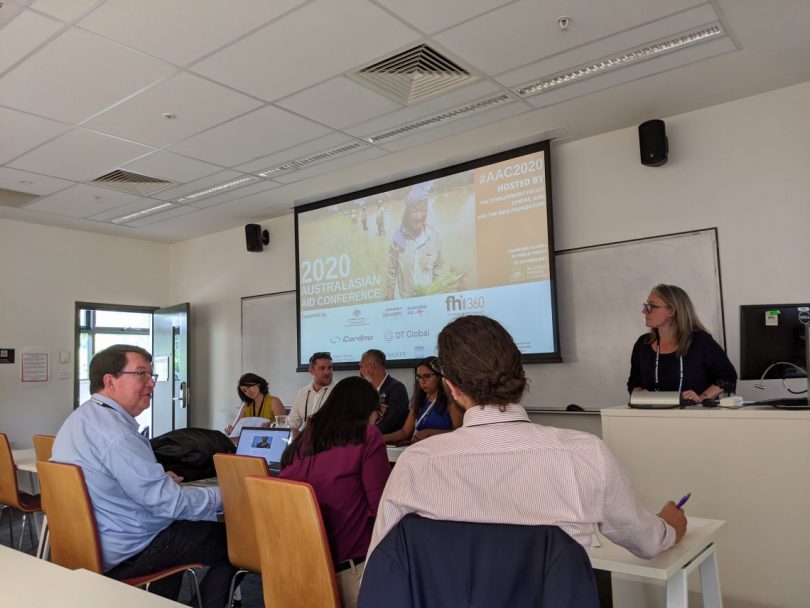It is accepted development best practice to procure goods and services locally wherever possible in order to maximise the benefit of official development assistance (ODA) for the overseas communities in which we operate. But why limit social impact to communities overseas? ODA offers opportunities to create impact in Australian communities as well. This is being partially realised through DFAT’s implementation of the Commonwealth’s Indigenous Procurement Policy. Increasing the participation of Indigenous businesses in the delivery of Australian aid will help create wealth and opportunities for Indigenous Australians, and provide the basis for Indigenous economic development in regional and remote Australia. However, adopting social procurement (of which Indigenous procurement is an important subset) more broadly offers even greater potential impact.
Social procurement leverages social outcomes from commercial procurement and can be achieved through a wide range of mechanisms, including procuring from impact-focused for-profit organisations such as social enterprises, employing people experiencing disadvantage, or even procuring from for-profit corporations with strong corporate social responsibility strategies. This type of procurement is gaining momentum globally and locally, including the establishment of ISO 20400: Sustainable Procurement (with a strong focus on social impact) in 2017, and the Victorian Government’s adoption of a Social Procurement Framework in 2019, among others.
The simplest way to introduce social procurement into development supply chains in Australia is at the goods and services level, for example, by purchasing from social or Indigenous enterprises. Assisted by Australia’s peak social enterprise procurement body, Social Traders, the University of Queensland’s International Development unit (UQID) has been successfully trialing such approaches by procuring merchandise from social enterprise Words with Heart, Indigenous enterprise Geared Up Culcha and other Brisbane-based social enterprises, Indigenous caterers, event spaces and cultural experiences.
However, the potential for social procurement extends all along the development supply chain, including the contracting of social and Indigenous enterprises with relevant technical expertise. Here, social procurement offers the greatest potential for social impact; not only are these contracts of greater value – thereby supporting greater social impact – the diversity of expertise that these organisations can offer is firmly rooted in community development by virtue of their social nature. This is especially true of Indigenous expertise, given that Indigenous professionals already act as the interface between non-Indigenous people and the Indigenous community, thus mirroring the development context. UQID is actively taking these steps, partnering with Indigenous consultancy firm i2i Global Development on a few recent projects and looking at new prospective partners.
The greatest challenge for social procurement for new suppliers is breaking into the market. Although social and Indigenous enterprises differ in size and capability, many are small and medium enterprises (SMEs) and new to the development sector. Therefore, encouraging social procurement requires both procurers and suppliers to work together to enable social impact to be achieved while maintaining a competitive marketplace.
First, bid evaluations must include weighted non-price selection criteria for social impact. This will re-frame what it means to be “competitive” as well as push existing suppliers to consider their social impact. Second, procurers must be sensitive to the needs of SMEs around the mechanics of doing business (e.g. invoicing, delivery time frames, tendering time frames), and take a more flexible and supportive approach to service delivery. Third, the focus on social procurement must be maintained through commitments and targets to allow social and Indigenous enterprises the consistency to acquire sector experience. Finally, procurers and suppliers must engage in regular and constructive dialogue to allow each other to adapt processes in order to maximise the social impact of procurement. This constructive and supportive approach is particularly needed in the case of Indigenous enterprises given the deep systemic barriers (including unconscious racial bias) that have excluded them from the market since Invasion.
Aside from generating social impact, there are significant incentives for procurers to engage in social impact. First, staff satisfaction and retention may increase with enhanced visibility of direct social impact. It also gives staff the opportunity to engage with a more diverse range of suppliers, therefore building understanding of the challenges facing the communities for which social and Indigenous enterprises create impact. Second, having both a strong social procurement strategy and impact reporting can increase shareholder satisfaction. Third, creating strong social procurement policies and practices currently affords procurers market leader status through creating greater value for money, enhancing social license to operate, and improving sustainability.
To ensure procurers maintain accountability and transparency, they must take several steps before entering into any procurement arrangement with a social or Indigenous enterprise. There have been cases of non-Indigenous firms claiming Indigenous status to take advantage of Indigenous procurement targets, known as “black-cladding” but more appropriately referred to as “white-anting”. To protect against this, procurers must verify that an Indigenous firm:
- Is a member of Supply Nation;
- Is majority Indigenous owned;
- Has appropriate shareholder structures that actively include Indigenous people;
- Has a majority Indigenous board and an Indigenous CEO
In the case of social enterprises, Social Traders maintains a register of certified social enterprises with robust standards governing their organisational structures and social or community versus private benefits of organisations. A key consideration for procurers is also designing systems to track social procurement spend and impact, and Social Traders are also able to assist in this regard.
Social procurement is still in the early phases of development globally, however adopting this concept offers the opportunity for both Australia and procurers to become leaders in this space. It creates exciting possibilities for collaboration with a more diverse range of suppliers and expertise, and it will generate greater social impact in both Australia and the overseas communities that we work in.
This blog post draws on a panel discussion on Social and Indigenous Procurement held at the 2020 Australasian AID Conference featuring the below panellists and the author would like to thank them for their expert input into this blog post:


Leave a Comment